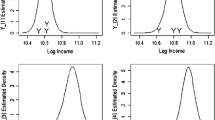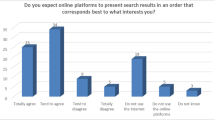Abstract
Consumer preferences can be measured by rankings of alternatives. When there are too many alternatives, this consumer task becomes complex. One option is to have consumers rank only a subset of the available alternatives. This has an impact on subsequent statistical analysis, as now a large amount of ties is observed. We propose a simple methodology to perform proper statistical analysis in this case. It also allows to test whether (parts of the) rankings are random or not. An illustration shows its ease of application.
Access this chapter
Tax calculation will be finalised at checkout
Purchases are for personal use only
Preview
Unable to display preview. Download preview PDF.
Similar content being viewed by others
References
Boatwright, P., & Nunes, J.C. (2001). Reducing assortment: An attribute-based approach. Journal of Marketing, 65, 50–63.
Chernev, A. (2003). When more is less and less is more: The role of ideal point availability and assortment in consumer choice. Journal of Consumer Research, 30, 170–183.
Deshazo, J.R., & Fermo, G. (2002). Designing choice sets for stated preference methods: The effects of complexity on choice consistency. Journal of Environmental Economics and Management, 43, 360–385, 2002.
Friedman, M. (1937). The use of ranks to avoid the assumption of normality implicit in the analysis of variance. Journal of the American Statistical Association, 32, 675–701.
Gourville, J.T., & Soman, D. (2005). Overchoice and assortment type: When and why variety backfires. Marketing Science, 24, 382–395.
Harter, H.L. (1960). Tables of range and studentized range. The Annals of Mathematical Statistics, 31, 1122–1147.
Hsu, J.C. (1996). Multiple comparisons. Theory and methods. London: Chapman & Hall.
Iyengar, S.S., & Lepper, M. (2000). When choice is de-motivating: Can one desire too much of a good thing? Journal of Personality and Social Psychology, 79, 995–1006.
Lattin, J., Carroll, J.D., & Green, P.E. (2003). Analyzing Multivariate Data. Canada: Brooks/Cole.
Marden, J.I. (1995). Analyzing and Modeling Rank Data. London: Chapman & Hall.
Sándor, Z., & Franses, P.H. (2009). Consumer Price Evaluations through Choice Experiments. Journal of Applied Econometrics, 24, 517–535.
Wittkowski, K.M. (1988). Friedman-type statistics and consistent multiple comparisons for unbalanced designs with missing data. Journal of the American Statistical Association, 83, 1163–1170.
Author information
Authors and Affiliations
Corresponding author
Editor information
Editors and Affiliations
Rights and permissions
Copyright information
© 2009 Springer-Verlag Berlin Heidelberg
About this paper
Cite this paper
Lam, K.Y., Koning, A., Franses, P.H. (2009). Analyzing Preference Rankings when There Are Too Many Alternatives. In: Fink, A., Lausen, B., Seidel, W., Ultsch, A. (eds) Advances in Data Analysis, Data Handling and Business Intelligence. Studies in Classification, Data Analysis, and Knowledge Organization. Springer, Berlin, Heidelberg. https://doi.org/10.1007/978-3-642-01044-6_51
Download citation
DOI: https://doi.org/10.1007/978-3-642-01044-6_51
Published:
Publisher Name: Springer, Berlin, Heidelberg
Print ISBN: 978-3-642-01043-9
Online ISBN: 978-3-642-01044-6
eBook Packages: Mathematics and StatisticsMathematics and Statistics (R0)




